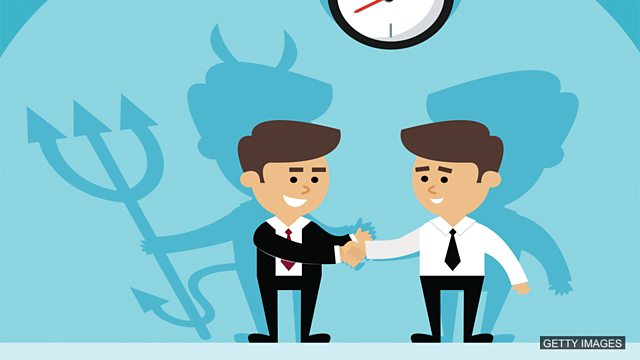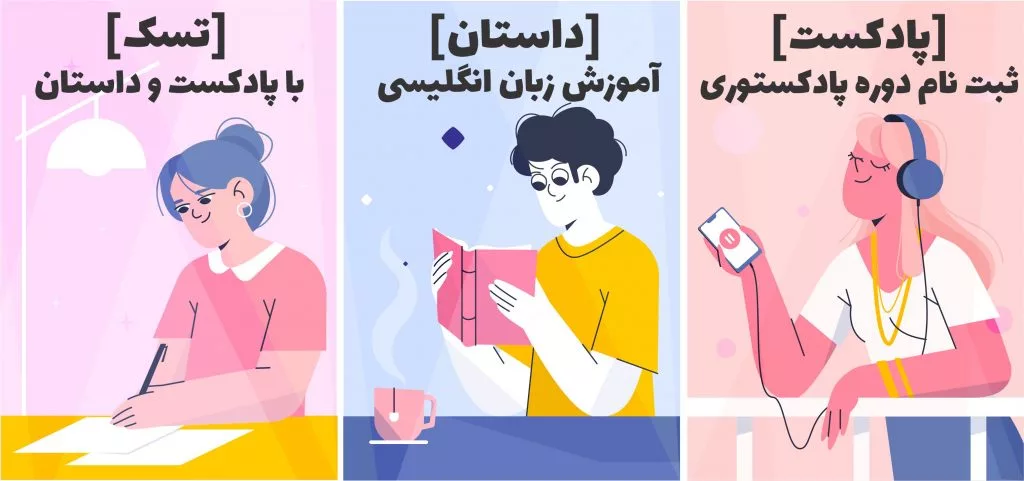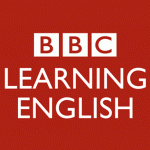پادکست انگلیسی BBC – صداقت
در پادکست انگلیسی BBC – صداقت ، درباره میزان صداقت افراد جامعه صحبت میشه. آیا تا به حال با عدم صداقت کسی یا گروهی را فریب دادهاید؟ آیا صداقت امری ذاتی ست و یا امری اکتسابی ست و به شرایط و اتفاقات زندگی انسانها وابسته است؟
سوال پادکست انگلیسی BBC – صداقت:
Who said ‘honesty is the best policy’? Was it…
a) Donald Trump
b) Benjamin Franklin
c) Richard Nixon?
به پادکست خوب گوش کن تا جواب رو پیدا کنی.
اگر می خوای گوش دادن به پادکست تا حد امکان برات ساده و کارآمد باشه مراحل زیر را دنبال کن:
هر روز به پادکست گوش کن. وقتی براش یه وقت ثابت در روز در نظر بگیری برات تبدیل به عادت میشه و این عادت هرروز پیشرفت میکنه.
پادکستی رو پیدا کن که موضوعش برات جالب باشه. وقتی از خود موضوع لذت ببری یادگیری هم برات لذتبخش میشه.
به پادکستی گوش کن که transcript یا متن داره. این بهت کمک می کنه تا کلمات و عبارات جدید رو به سرعت در متن پیدا کنی و ساختار انواع مختلف جمله رو خوب یاد بگیری.
پس از گوش دادن به پادکست با متن، در مرحله بعدی سعی کن بدون نگاه کردن به متن این کار رو انجام بدی. این کار مهارت شنیداری رو تقویت می کنه و کمک می کنه تا انگلیسی زبانان بومی را راحت تر درک کنی، حتی اگر خیلی سریع صحبت کنن.
اگه به پادکست انگلیسی گوش کردی و نتونستی کامل متوجه اش بشی، ناامید نشو. پادکست هایESL -English as Second Language بیشماری وجود دارن که برای سطوح مختلف، از ابتدایی تا پیشرفته طراحی شدن. مطمئنا هر روز می تونین یه پادکست مناسب با سطح خودت پیدا کنی.
فراموش نکن که هرچی بیشتر تمرین کنی در اون مهارت رشد میکنی! به قول انگلیسی ها: Practice makes perfect
واژگان کلیدی پادکست انگلیسی BBC - صداقت
| معنی به فارسی | معنی به انگلیسی | واژه |
| صادق، راستگو | truthful | honest |
| فریب دادن کسی برای رسیدن به چیزی که میخواهید | trick or deceive someone to get something you want | cheat |
| مصرف کننده | person who buys things or services | consumer |
| روشی که ما فکر می کنیم | the way the human mind works, the way we think | psychological make up |
| خود خواه | someone who only cares about themselves and not about other people | selfish |
| همکاری مشترک در جهت اهداف مشترک | working together towards shared goals | co-operatively |
BBC 6 minute English -How honest are we?

برای دانلود پادکست روی سه نقطه سمت راست کلیک و گزینه Download را انتخاب کنید.
متن پادکست انگلیسی BBC - صداقت
Neil
Hello and welcome to 6 Minute English, where we bring you an interesting topic and six items of vocabulary. I'm Neil, and joining me is Rob.
Rob
Hello there! And today we've got six minutes to talk about honesty and how honest people are – particularly when it comes to spending money. So Neil – what's an 'honesty box'?
Neil
Well, it's where you pay for something by putting money in a box – but it's up to you to put in the right amount. A small business might use this method to take money for things like parking your car or buying a newspaper because it means you don't need a sales assistant.
Rob
But that means people could take a newspaper or park their car without paying anything! An honesty box relies on people being honest. The adjective honest means truthful and not trying to cheat people.
Neil
And the noun is honesty – the quality of being truthful. Have you ever cheated an honesty box, Rob?
Rob
Absolutely not! I've never have!
Neil
Honestly?
Rob
Honestly! And to cheat, by the way, means to trick or deceive someone to get something you want. Honesty is the best policy, as they say…
Neil
Which of course leads us on to our quiz.
Dan
The 6 minute English quiz! Who said ‘honesty is the best policy’? Was it…
a) Donald Trump
b) Benjamin Franklin or
c) Richard Nixon?
Rob
Honestly, Neil! Everyone will know the answer to that.
Neil
But do you know the answer to that, Rob?
Rob
Well, I'll have an honest guess. I think it's b) Benjamin Franklin.
Neil
Well, you might be right, but you might not – we'll find out at the end. I did like your use of 'honestly' there, Rob. We can use the adverb 'honestly' at the beginning of a sentence to show that we're feeling irritated – for example when your co-presenter picks a quiz question that's too easy!
Rob
OK, OK, let's move on now and hear from Philip Graves, a psychologist, and author of the book Consumerology, who can tell us about why honesty isn't always the best policy.
INSERT
Philip Graves, Psychologist and author of the book Consumerology
The question is not 'Are most consumers honest, the question is 'Are most people honest?' – And the answer to that is 'no'. We have evolved with the capacity to be dishonest. It's part of our evolutionary psychological make up – because if we can gain an advantage over the people around us, we have a greater chance of surviving. Now what's important in that is that we also benefited from being in a social group and that was important in our evolutionary past so there is a balance to strike between the extent to which we can feather our own nest, so to speak, and the risk of being ostracised by the group.
Neil
A consumer is a person who buys things or services – for example, food or clothes.
Rob
Or the use of a parking space – or a taxi.
Neil
Now, if I park my car and don't pay for the parking space, I'm being dishonest, but I'm also saving money.
Rob
And Philip Graves says being dishonest is part of our 'psychological make up'. What does that mean?
Neil
Our psychological make up is the way the human mind works – the way we think.
Rob
And it makes sense to be dishonest if you gain an advantage through this behaviour. So when you take something without paying for it, you save money you can spend on something else.
Neil
So why do we place such importance on being honest then? – If we benefit from being dishonest?
Rob
Because it's selfish behaviour – which other members of our social group won't like. If everybody acted selfishly and dishonestly all the time, the world would be a very unpleasant place!
Neil
Selfish – meaning only caring about yourself and not about other people. That's a good point, Rob.
Rob
Yes, societies work better if people behave co-operatively – which means working together towards shared goals.
Neil
So honesty really is the best policy then – at least most of the time!
Dan
And now it's time for the answer to the quiz. Who said ‘honesty is the best policy’?
Neil
What do you think, Rob?
Rob
OK. Was it Benjamin Franklin?
Neil
And that was… the right answer! Maybe the question was too easy! Benjamin Franklin wrote it in a book of proverbs called Poor Richard's Almanac between 1732 and 1758. Other famous quotes include 'There are no gains without pains' and 'Have you something to do tomorrow? Do it today.' OK let's follow Franklin's wise words and move right ahead with the vocabulary items we learned today.
Rob
First up was the adjective honest – meaning truthful and not trying to cheat people – For example, 'Neil has a very honest face'. OK, then there's … um …. honesty and honestly… the noun and adverb forms. For example, erm…
Neil
Honestly, Rob, hurry up and do the second item!
Rob
OK, OK, I'm getting there! To cheat – means to behave dishonestly to get what you want.
Neil
My granny always used to cheat in card games. It was so annoying!
Rob
And I always used to cheat in spelling tests at school!
Neil
How dishonest, Rob! OK, number three. Consumer – a person who buys goods or services for their own personal use.
Rob
For example, 'I am a big consumer of chocolate bars'.
Neil
That's terrible English, Rob! How about – 'We asked UK consumers how much money they spent on food every month'?
Rob
OK, I agree that's a better example. Anyway, I never consume chocolate. Number four!
Neil
Psychological make up – the way our minds work. The way we think.
Rob
For example, 'He had the psychological make up of a serial killer…'
Neil
That's nasty! Moving on – selfish – caring only about yourself and not other people.
Rob
You only made yourself a cup of tea – that was a selfish thing to do!
Neil
What???
Rob
It was just an example. You're not selfish, Neil. You're actually the most co-operative person I know – you're happy to work with others towards a common goal.
Neil
Not selfish then?
Rob
Never selfish. Always co-operative… And honest too.
Neil
Great. Now, I honestly recommend that listeners visit our Facebook, Twitter, Instagram and YouTube pages.
Rob
You can co-operate with other learners in your common goal of improving your English! Bye-bye!
Neil
Goodbye!
امیدوارم از پادکست انگلیسی BBC - صداقت لذت برده باشید.
گوش دادن به پادکست روش خوبی برای تقویت مهارت شنیداری و هم چنین یادگرفتن کلمات در بستر یک موضوع خاصه که این به تقویت مهارت مکالمه انگلیسی نیز کمک زیادی می کنه.
اگه تو هم از اون آدمهایی هستی که از گوش دادن به پادکست لذت می بره برات یه خبر خوب دارم! آموزشگاه زبان انگلیسی 24talk یه دوره طراحی کرده مبتنی بر پادکست و داستان کوتاه به اسم "پادکستوری - Podcastory". این دوره سعی کرده یادگیری زبان انگلیسی رو مناسب با نیاز و سطح زبان آموز به یه فرایند بسیار مفرح، موثر، سریع و کم هزینه تبدیل کنه.
همین الان می تونی با کلیک روی عکس زیر و ثبت نام در دوره ی آموزش زبان انگلیسی با پادکست و داستان ۲۴talk اولین و مهم ترین قدم رو برای یادگیری زبان انگلیسی برداری. وقت رو از دست نده!
دوره پادکستوری آکادمی مجازی 24talk
برای شنیدن دیگر پادکست ها، به بخش پادکست در مرکز آموزش رایگان مراجعه نمایید.












